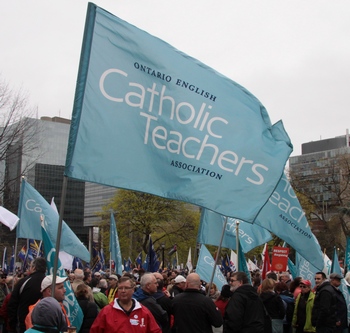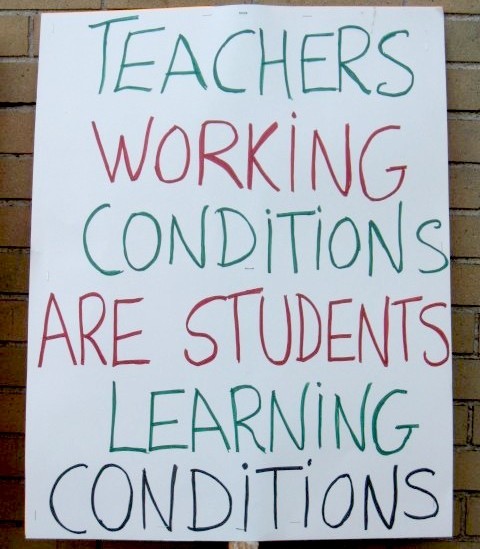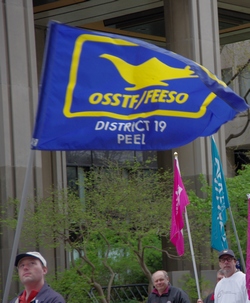|
July 9, 2012 - No. 40
Defend the Rights of Teachers and
Education Workers!
Province Pressures Catholic Teachers' Union with Threat
to Legislate Contract
Defend
the
Rights
of
Teachers
and Education Workers!
• Province Pressures Catholic Teachers' Union
with Threat to Legislate Contract - Christine Nugent
• Tentative Agreement Denies Local Bargaining
Rights
• Province Usurping Control Over District
School Boards - Laura Chesnik
• Teachers' Unions Oppose Government "Roadmap
for Education" - Sylvia Etts
Who Said What
• Ontario Secondary School Teachers'
Federation -- Defend Your Rights!
• School Support Staff Join Teachers in
Rejecting "Roadmap" to Ruin - Canadian Union of Public
Employees-Ontario
• Elementary Teachers' Federation of Ontario
-- Respect Free Collective Bargaining
• French Language Teachers and Education
Workers - L'Association des enseignantes et des enseignants
franco-ontariens
For Your Information
• Agreement Between Catholic Teachers and
Provincial Government - Excerpts
Defend the Rights of Teachers and
Education Workers!
Province Pressures Catholic Teachers' Union with Threat
to Legislate Contract
- Christine Nugent -

On July 5, a tentative agreement was reached in
negotiations
between the provincial government and the Ontario English Catholic
Teachers Association (OECTA) at the Provincial Discussion Table (PDT).
This agreement follows five months of negotiations held under a
threat by the government that it would
impose a legislated agreement if the teachers do not submit to demands
for concessions. The tentative agreement is on parameters governing
local collective agreement negotiations in the fall.
A special meeting of the Council of Presidents of
OECTA's local units is scheduled for the week of July 9 to consider the
terms of the
agreement. The agreement is subject to a ratification vote by the
membership. OECTA represents 34,000 teachers who are employed by 29
English Catholic district school
boards and five Catholic school authorities. They teach 600,000
students.
The Catholic school boards were represented at the PDT
negotiations
by the Ontario Catholic School Trustees Association (OCSTA). The night
before the agreement was reached the OCSTA walked out of the
negotiations over what it called unacceptable arrangements. This means
that the agreement was reached
without consent of the 250 trustees elected by Catholic school
ratepayers. This is unprecedented.
In a letter to its membership on July 5, OECTA explained
its
position in the provincial negotiations as follows: "The provincial
budget and school board funding grants that came out in March
entrenched these fiscal constraints. These parameters were unacceptable
to OECTA and even prompted some unions to
leave the discussions. OECTA remained at the table because we believe
that a negotiated settlement is superior to one imposed upon our
members through legislation. The Association's goal throughout the
process was to mitigate the impact of the government's parameters on
our members and ensure that the impact
of fiscal restraint would be equitably shared throughout the Catholic
system. As well, a negotiated settlement allowed us the opportunity to
address non-monetary issues."
 After reaching the
memorandum of understanding with OECTA, the government with the media
created a frenzy around it
aimed at stopping education workers, other public sector workers and
the public from taking a sober look at the developments. The Toronto
Star
declared
the tentative agreement "a McGuinty miracle." Ontario Finance Minister
Dwight Duncan threatened that the OECTA agreement would be used as a
template for dictating terms not only for contracts with other teachers
and educational workers but for contracts across the public sector. After reaching the
memorandum of understanding with OECTA, the government with the media
created a frenzy around it
aimed at stopping education workers, other public sector workers and
the public from taking a sober look at the developments. The Toronto
Star
declared
the tentative agreement "a McGuinty miracle." Ontario Finance Minister
Dwight Duncan threatened that the OECTA agreement would be used as a
template for dictating terms not only for contracts with other teachers
and educational workers but for contracts across the public sector.
Teachers and education workers, as well as students,
reject these attempts to create disarray and hysteria in their ranks.
Already, they expressed broad opposition to the government's austerity
budget and agenda when they demonstrated at Queen's Park on April 21.
The government's trampling of the collective bargaining process at the
PDT with the threat of a legislated contract will not miraculously make
austerity measures acceptable to anyone. Teachers, education workers
and other
workers in the public and private sectors must inform themselves and
their peers about what the government is up to and decide how best they
can defend their interests by upholding their rights and the rights of
all.

Tentative Agreement Denies Local Bargaining Rights
One of the main objections to the tentative agreement
between the provincial government and the Ontario English Catholic
Teachers Association (OECTA) reached on July 5 is that besides the
non-monetary sections of the tentative agreement (provided below), the
government has put pressure on the Catholic teachers union to submit to
their dictate in a manner which denies the right of local units to
negotiate collectively and strike on local issues. Teachers and
education workers are taking stock of the significance of this
arrangement to their right to bargain and negotiate their wages and
working conditions.
In the tentative agreement, under the section entitled
"Opportunity
to Bargain Locally and Avoid Disruptions to Student Learning," it says
that a period of local bargaining will commence following the signing
of the agreement and shall cease by December 31, 2012.
It says that there shall be no strikes, lockouts or
requests for conciliation during local bargaining. As a condition of
the memorandum of understanding, the
provincial union was also pressured to give up the right of local
unions to
strike on issues related to local agreements.
As well, the
province is using the students' academic year as a pressure tactic. It
appears that
bargaining has been extended to December 31,
despite the fact that most contracts expire
at the end of August, or early September. This means teachers can't
strike until at least December 31, at which point there
would be much more pressure on teachers not to strike with the school
year half
completed, rather than striking at the beginning of the school year,
when classes could
be made up later.
Furthermore, the agreement states that the
publicly-funded Catholic school system (not teachers per
se) will not be financially
disadvantaged in any way as a result of other financial settlements
reached in any other agreements, subject to OECTA and school boards
fully complying with the conditions
associated with the memorandum of understanding.

Province Usurping Control Over
District School Boards
- Laura Chesnik -
With provincial negotiations between district school
boards and education workers' unions underway, the Ontario government
is demanding more control over the affairs of school boards by imposing
changes to their budgeting practices and having boards submit any
contracts to the province before being signed.
The changes to the budgeting practices by the Ministry
of Education include how school boards account for unfunded liabilities
like banked sick days used as retirement gratuities. District school
boards report that the Ministry is demanding they budget for retirement
gratuities as if all their employees were to retire within the year and
for retirements as if all their employees were to retire within 15
years.
Under the current Ontario
Education
Act, school boards are only allowed to
budget for a deficit of one per cent of their revenues. During the
Harris regime, the Education Act
was amended in 1999 so that school boards had to have balanced budgets,
i.e., no more than a one per cent deficit. This was done to force local
school boards to implement the massive cuts to
education funding made by the province. In 2000, the Windsor school
board forced the issue by running a deficit, and was given an
additional $20 million. In 2002, the Ottawa, Toronto and
Hamilton school boards, the three largest in the province, all broke
the law by passing deficit budgets. They maintained it was impossible
to meet the requirements of the Education
Act for balanced budgets because of insufficient provincial
funding. Then-Education Minister Elizabeth Witmer had these boards
audited then put under provincial
supervision, sidelining the elected trustees.
Now, these new changes to school board budgeting
practices will make boards appear to have larger deficits than they
actually
do, as they have to account for liabilities that are unrealistic and
higher than what
they would actually be. The result: district school boards will have to
apply to the province to allow them to carry a deficit larger than the
permitted one per cent of their revenues.
District school boards are responsible for determining
the number, size and location of schools; building and equipping
schools; developing education programs; managing funds; supervising
school operations; hiring and supporting teachers; approving textbooks;
and making sure its schools follow the Ontario
Education Act. This includes making decisions on school board
policy
and managing board finances. They also ensure that schools have the
required curriculum materials, facilities, and staff.
Currently, Ontario has 72 Public District School Boards
including:
- 31 English-language public boards
- 29 English-language Catholic boards
- 4 French-language public boards
- 8 French-language Catholic boards
Ontario also has 11 school authorities. School
authorities consist of geographically isolated boards and hospital
school boards. Public district school boards and school authorities
together serve more than two million elementary and secondary students
in the province of Ontario.
By forcing district school boards to budget for
improbable liabilities
and demanding they submit contracts to the province for approval, much
of the local authority over education is being usurped by the province.

Teachers' Unions Oppose Government
"Roadmap for Education"
- Sylvia Etts -
On
July 6, the Elementary Teachers' Federation of Ontario (ETFO),
the Ontario Secondary School Teachers' Federation (OSSTF), the Canadian
Union of Public Employees-Ontario (CUPE-O), and L'Association des
enseignantes et des enseignants franco-ontariens (AEFO) reiterated
their stand against the government's
dictate to impose austerity measures and undermine teachers' working
conditions. The press conference came after a memorandum of
understanding was reached on July 5 between the Ontario English
Catholic
Teachers Association (OECTA) and the province.
On July 5, the day the
memorandum between OECTA and the
government was signed, Minister of Education Laurel Broten claimed that
the government's attacks on teachers' working conditions, justified on
the basis of "austerity," somehow defend the education system: "We
have made a deliberate
choice in this process -- a choice to protect the gains we have made in
education and to work with our partners, as we've done for the past
four months. These were never going to be easy discussions, but I'm
pleased that after months of difficult talks, we were able to reach an
agreement with OECTA. It's an example
of how teachers can successfully enter into such discussions with
government that result in solutions that both protect student
achievement and help us meet our fiscal targets."
 Two hours before the joint
press conference of education
workers on
July 6, Finance Minister Dwight Duncan repeated the disinformation that
the deal reached with the OECTA "provides a roadmap ... that will help
us deliver our shared objective of eliminating the deficit. [...] This
memorandum of understanding
... sends a strong signal that the ... government and its broader
public sector partners can reach agreements that allow Ontario to
protect the gains we have made in schools and health care, while
staying on track to meet our fiscal targets and eliminating the
deficit." Two hours before the joint
press conference of education
workers on
July 6, Finance Minister Dwight Duncan repeated the disinformation that
the deal reached with the OECTA "provides a roadmap ... that will help
us deliver our shared objective of eliminating the deficit. [...] This
memorandum of understanding
... sends a strong signal that the ... government and its broader
public sector partners can reach agreements that allow Ontario to
protect the gains we have made in schools and health care, while
staying on track to meet our fiscal targets and eliminating the
deficit."
To the contrary, it is
precisely because of the government's refusal
to negotiate in good faith that the ETFO, AEFO, CUPE-O and OSSTF have
had little choice but to walk away from the Provincial Discussion Table
at
various points over the past five months. They object to the cuts to
education that have already
caused school boards to force unfavourable conditions on teachers,
education workers and students and are opposed to the
McGuinty government's forcing them to accept its roadmap of wage
freezes
and other concessions or face legislation. In April the unions filed a
legal challenge with the Ontario Labour
Relations Board (OLRB) regarding issues related to the collective
bargaining process.
 At the July 6 press
conference, the monopoly media took
up the
government's disinformation about austerity and asked the union
representatives to explain what sort of concessions they preferred. The
unions all stood firm against any measures that would undermine the
education system they had worked hard to
achieve over the years and in their opposition to a legislated
settlement. (To view a video of the press conference, visit: www.controlyourfuture.ca) At the July 6 press
conference, the monopoly media took
up the
government's disinformation about austerity and asked the union
representatives to explain what sort of concessions they preferred. The
unions all stood firm against any measures that would undermine the
education system they had worked hard to
achieve over the years and in their opposition to a legislated
settlement. (To view a video of the press conference, visit: www.controlyourfuture.ca)
In this issue, Ontario
Political
Forum is presenting reports
from the
media session and reproducing statements from the unions to assist
teachers,
education workers, parents and students in their discussions.
The question of who decides and fighting for a new direction for the
economy is on the agenda for all
to consider.

Who Said What
Ontario Secondary School Teachers' Federation -- Defend
Your Rights!
 "The deal may be good
enough for [the Ontario English Catholic Teachers Association -- OECTA]
members, but it is not good enough for [Ontario Secondary School
Teachers' Federation -- OSSTF/FEESO] members," said Ken Coran, the
union's president at the July 6 press conference of teachers' and
education workers' unions following the tentative agreement reached
between the province and OECTA. "It is not good for students, it is not
good for young members,
and it is not good for Ontario." The OSSTF stands firm on refusing to
accept the parameters in the government's last offer which insists on
assessing how to restructure the pay grid for young teachers. "The deal may be good
enough for [the Ontario English Catholic Teachers Association -- OECTA]
members, but it is not good enough for [Ontario Secondary School
Teachers' Federation -- OSSTF/FEESO] members," said Ken Coran, the
union's president at the July 6 press conference of teachers' and
education workers' unions following the tentative agreement reached
between the province and OECTA. "It is not good for students, it is not
good for young members,
and it is not good for Ontario." The OSSTF stands firm on refusing to
accept the parameters in the government's last offer which insists on
assessing how to restructure the pay grid for young teachers.
President Coran, also on July 6, reminded a CBC radio
host that after the government made its initial austerity proposal to
the Provincial Discussion Table in February, OSSTF responded with their
own proposals. These were outright rejected by the government and he
noted that the government has not officially invited
the Federation back to the table. "A road map is a way to get between
two points. You don't necessarily have to take the same path," he said,
adding:
"We tabled a proposal to the government back in April
that would give them additional cost savings. OSSTF/FEESO offered to
the government a provincial benefits plan proposal that would save the
government hundreds of millions of dollars. We also offered the
government a four year deal that included a
two year wage freeze, and modest cost of living salary increases in
years three and four. The government rejected those proposals without
any consideration."
"Our members will be taking strike votes from August
27th to September 7th. They expect a deal that addresses OSSTF/FEESO's
concerns. Our predecessors fought for our rights, and we intend to
defend those rights."
OSSTF/FEESO, founded in 1919, has 60,000 members across
Ontario. They include public high school teachers, occasional teachers,
educational assistants, continuing education teachers and instructors,
early childhood educators, psychologists, secretaries, speech-language
pathologists, social workers, plant support
personnel, university support staff, and many others in education.

School Support Staff Join Teachers in Rejecting
"Roadmap" to Ruin
- Canadian Union of Public
Employees-Ontario (Excerpts) -
The following excerpts are taken from the Canadian Union
of Public Employees (CUPE) Ontario website.
***
 "This deal is only a
roadmap to ruin," said Fred Hahn, CUPE Ontario President representing
55,000 school board employees. "Ontarians demand a quality education
for their kids, and cutting hundreds of jobs and bullying the people
who provide that education will only drive the best and the
brightest away. It's no way to build success...." "This deal is only a
roadmap to ruin," said Fred Hahn, CUPE Ontario President representing
55,000 school board employees. "Ontarians demand a quality education
for their kids, and cutting hundreds of jobs and bullying the people
who provide that education will only drive the best and the
brightest away. It's no way to build success...."
"... A government-imposed settlement for all
education-sector workers makes no sense," said Hahn. "It would fly in
the face of the Premier's repeated statements about his government
respecting the collective bargaining process and it would serve to
weaken the services our schools provide."
Despite assurances from Dalton McGuinty that his budget
would not mean cuts to education, school boards across the province
have begun announcing hundreds of cuts to positions including teachers,
educational assistants, school secretaries, social workers and
psychologists.
"Our schools are the front line in building strong
communities, healthy citizens and a strong economy," said Terri
Preston, Chair of the CUPE Ontario School Board Coordinating Committee.
"School Boards are finalizing their budgets for next year and they are
being forced to make devastating cuts to programs
and staffing. That means fewer supports for the most vulnerable kids,
which will increase dropout rates and cost our society dearly."
"The Liberals have repeatedly said that they will
respect the collective bargaining process, but they also keep
threatening to legislate their will if negotiations don't go their
way," said Preston. "That's not respecting the process. That's
bullying, and it's setting a bad example for everyone."
CUPE Ontario will stand with communities to protect one
of the best education systems because our students and our province
deserve nothing less.
"We're standing together today with teachers'
federations because Ontario students deserve a great education and
Ontario parents demand a great educational system," said Hahn. "Ontario
is a great place with great schools. We'll do everything in our
abilities to protect and enhance our public schools. Ontario's
future depends on it."

Elementary Teachers' Federation of Ontario --
Respect Free Collective Bargaining
 At the July 6 press
conference Sam Hammond, President of the Elementary Teachers'
Federation of Ontario (ETFO) criticized the McGuinty government
explaining that the teachers had to weather ten years of cuts and
attacks during the Harris government. He said, "To unilaterally freeze
public sector wages, benefits,
and grid movement, without negotiating, without bargaining in good
faith, is misguided and wrong. We call on you to respect free
collective bargaining." At the July 6 press
conference Sam Hammond, President of the Elementary Teachers'
Federation of Ontario (ETFO) criticized the McGuinty government
explaining that the teachers had to weather ten years of cuts and
attacks during the Harris government. He said, "To unilaterally freeze
public sector wages, benefits,
and grid movement, without negotiating, without bargaining in good
faith, is misguided and wrong. We call on you to respect free
collective bargaining."
The ETFO left the Provincial Discussion Table at the
beginning and has refused to attend further talks due to the government
agenda of stripping the collective agreements. From the beginning
McGuinty said his government is only interested in discussing ideas
that "stay within the fiscal parameters" already set.
Those "parameters" include cuts to social program
funding by holding increases below the rising cost of living, cuts and
privatizing of public services to transfer more government revenue to
debt servicing and to "pay down the debt."
He explained the need to have the voices and demands of
the teachers in negotiations which includes the demand to end the
Education Quality and Accountability Office (EQAO). "EQAO and literacy
and numeracy initiatives require exorbitant costs and they overwhelm
teachers," he said.
Every year, the EQAO conducts Ontario-wide tests to
measure Grade 3, 6 and 9 students' achievement of reading, writing and
mathematics curriculum expectations. The cost and complaints from
teachers brings into question the reliability of standardized EQAO
test scores as a basis for assessing the overall quality of a school.
In a May 19 letter to all MPs, the ETFO stated the
union's solid position against concessions. It says: "Freezing public
sector wages, benefits, and grid movement is not the way to deal with
the government's deficit. The Ontario deficit was not caused by
spending on public services or public sector wages.
"Public
sector bargaining responds to economic conditions. Teacher salary
increases have followed inflation rate trend lines for the past three
decades. There is no need to legislate salaries.
"They ensure the safety and well-being of children and
citizens throughout Ontario. They work hard to build a kinder, gentler,
more compassionate society for all of us.
"High-quality public services are the foundation of a
just society. But they do much more. They provide economic support to
thousands of communities. They provide high-quality jobs. In Ontario,
according to Statistics Canada, 36 cents of every dollar of public
sector spending is used to purchase goods or services
in the private sector."
"How will students be served by a demoralized
workforce?" said Hammond at the Friday press conference. "[T]he OECTA
deal is not a road map to follow, it is a road block to local
bargaining." He encouraged OECTA members to vote No on a bargaining
process that undermines collective bargaining.
Hammond emphasized that ETFO members will be in school
in September as professionals and will be taking strike votes.
93 Per Cent of ETFO Members in Favour of One-Day
Walkout,
- ETFO eNewsletter,
Bargaining Edition, Number 7, June 26, 2012 -
Recently, ETFO members participated in an all-member
vote to assess support for a one-day political protest in the event the
Ontario government introduces legislation
imposing unilateral changes to ETFO collective agreements or to the
collective bargaining process.
Over the course of two weeks, information meetings were
held in every local. ETFO members were given the opportunity to cast
their ballots in support of, or in opposition to, a one-day political
protest.
All members -- teachers, occasional teachers, Designated
Early Childhood Educators (DECE)s, Educational Support Personnel
(ESP)s, and Professional Support Personnel (PSP)s -- were given an
opportunity to vote on the question of holding a one-day political
protest.
An overwhelming majority of ETFO members participated in
the political protest vote, and the results are now available: 93 per
cent of voting members are in support of a one-day political protest if
required by government actions.

French Language Teachers and Education Workers
- L'Association des enseignantes et des
enseignants franco-ontariens -
L'Association
des enseignantes et des enseignants franco-ontariens (AEFO), the
association of french language teachers and education workers, with
about 10,000 members, represents teachers and some professional,
administrative and support workers at French language elementary and
secondary schools and
other Francophone institutions in Ontario. They are demanding that the
government respect their workers and the collective bargaining process.
 The union rejects the
government imposing on its members
the
agreement reached July 5 with the Ontario English Catholic Teachers'
Association (OECTA). The union rejects the
government imposing on its members
the
agreement reached July 5 with the Ontario English Catholic Teachers'
Association (OECTA).
"AEFO firmly believes in collective bargaining," said
its senior
vice president, Anne Vinet-Roy. "We believe that if all sides show an
open mind and a willingness to negotiate, it is possible to find
win-win solutions."
"AEFO is ready to resume talks with the provincial table
if the
government and school boards are more flexible and identify solutions
that meet the specific needs of our members," added Ms. Vinet-Roy. "We
think it is wrong to impose an agreement on us 'copy and pasted' from
the tentative agreement reached
with OECTA."
"As required by the Act respecting labour relations,
AEFO is
preparing to begin negotiations at the local level with each board
shortly after school starts in the fall," says Ms. Vinet-Roy. "We hope
the government will not seek to impose its will through legislation..."

For Your Information
Agreement Between Catholic Teachers and
Provincial Government
- Excerpts -
Professional Judgment and the Effective use of
Diagnostic Assessment
- Teachers shall use their professional judgment to
determine which
assessment and/or evaluation tool(s) from the Board list of
pre-approved assessment tool(s). As well as student(s) tested,
frequency and timing of tests.
- The Ministry of Education will release a Policy
Program Memorandum
(PPM) with respect to the effective use of diagnostic assessment.
- Boards shall provide a list of pre-approved assessment
tools
consistent with their Board improvement plan for student achievement.
Fair Hiring Practice
- It is recognized that the hiring process of teachers
for long term
occasional (LTO) and/or permanent positions be based on seniority and
qualifications.
- Fully transparent process to end nepotism.
Wage Freeze
- Zero per cent wage increases for two (2) years
(2012-13 and 2013-14) for teachers.
- Zero per cent wage freeze for senior board
administrators.
- Every teacher, Vice Principal and Principal will take
three (3) unpaid days in the 2013-14 school year.
- The unpaid days will be taken on professional
development days.
- The unpaid days will have no impact on pension
calculations.
Salary Grid
- Teachers whose salaries are determined based on their
placement on
a salary grid and who are not at the maximum(s) of their experience on
the salary grid will move through and across the salary grid in
accordance with their individual experience and qualifications and in
accordance with their local collective
agreement.
- The increment shall come into effect on the
ninety-seventh (97th) day of each school year.
- The government shall review school board salary grids
with
stakeholders during the term of the 2012 to 2014 agreement including
but not limited to how employees move on the experience and
qualification salary grid and the variation currently in the monetary
value of each grid step with a view to future
sustainability.
Sick Leave
- Each school year, a teacher shall be paid 100% of
regular salary
for up to ten (10) days of absence. These days shall not accumulate.
- Short-term leave and disability plan (STLDP): a
teacher absent
beyond ten (10) days and eligible for this plan shall be entitled to an
additional 120 days paid at 90% of regular salary.
- Teachers will be eligible for the STLDP: due to an
absence of five
(5) or more consecutive days beyond the ten (10) sick leave days paid
at 100% OR due to an ongoing or intermittent medical condition.
- Not eligible for STLDP: a teacher absent beyond ten
(10) days
shall be entitled to an additional 120 days of shortterm sick leave
paid at 66.66% of regular salary.
- Leave provisions under the current 2008-2012
collective agreement
that uses deduction from sick leave for reasons other than illness
(i.e., bereavement) shall be granted a maximum of five (5) days per
school year without deduction of sick leave or loss of salary.
- WSIB benefits shall be maintained in accordance with
the 2008-2012 local collective agreement.
- A teacher shall receive 100% of their regular salary
for not less
than six (6) weeks following the birth of a child. Teachers requiring a
longer period can access the shortterm leave and disability plan.
- An adjudication process will be established with the
Ontario Teachers' Insurance Plan (OTIP) to resolve disputes.
- Effective January, 2013, the Association shall be the
policyholder of the long-term disability plan.
- Pension amendment to provide for full pension
contributions at grid salary.
Retirement Gratuities
- Effective August 31, 2012 employees eligible for a
retirement
gratuity shall have their existing accumulated sick leave vested up to
a maximum under the retirement gratuity plan.
- Upon retirement, an employee eligible for a retirement
gratuity
shall receive a gratuity payout based on the employee's current
accumulated vested sick days and years of service and salary as of
August 31, 2012.
- Effective September 1, 2012, all accumulated
non-vested sick days shall be eliminated.
Pension
- Pension plan discussions and decisions will be made
between the
plan partners -- the government and the Ontario Teacher's Federation.
Pensions will not be addressed in this agreement.
Benefits
- A committee shall be established to investigate the
creation of one or more provincial benefit plans for the education
sector.

PREVIOUS
ISSUES | HOME
Read Ontario Political Forum
Website: www.cpcml.ca
Email: ontario@cpcml.ca
|

